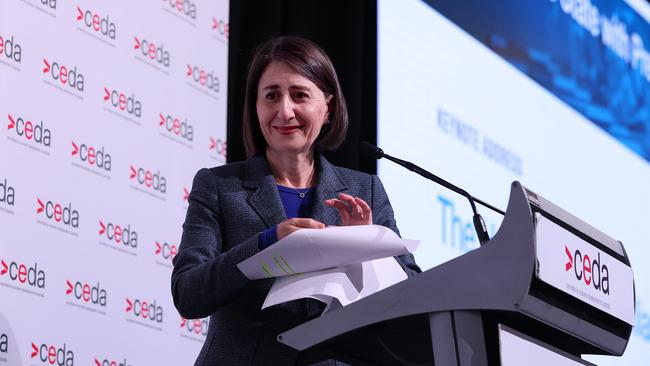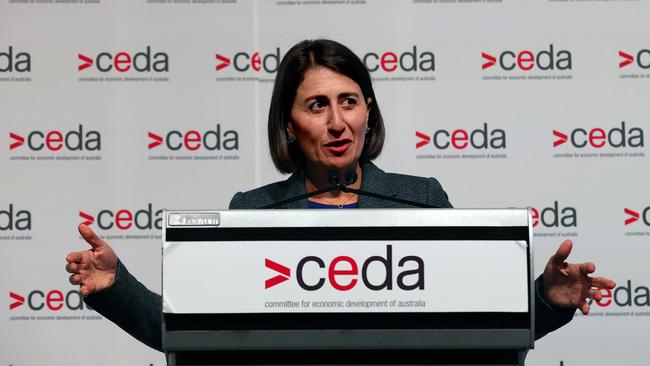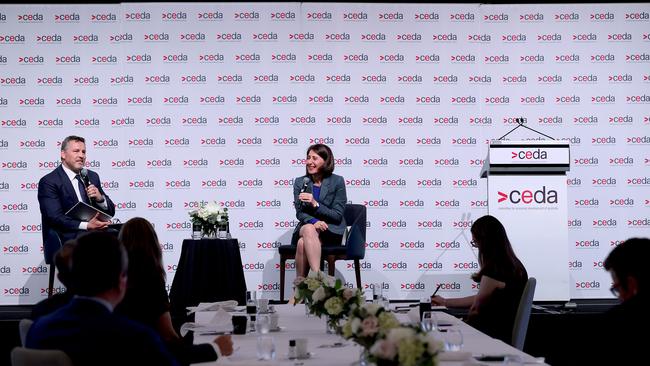Gladys Berejiklian announces payroll tax cuts scheme
Premier Gladys Berejiklian has made a major announcement in a bid to persuade Queensland businesses to move to NSW.
Businesses will pay zero payroll tax on some new jobs under a new NSW government scheme designed to lure companies from Brisbane and elsewhere to relocate in the state.
The NSW Premier used her State of the State speech to reveal the new Jobs Plus Program, which will support businesses that want to move their headquarters to NSW or create new jobs there.
Under the scheme, businesses that create 30 jobs or more will pay no payroll tax for each new job over that threshold.
That means if a company creates 100 new jobs, 70 of those will be payroll tax free.
The scheme will last for four years after which the government hopes the state will benefit from new jobs established.

“We will unashamedly encourage businesses to relocate their headquarters to NSW,” the Premier told the audience gathered at Sydney’s Four Seasons hotel.
Ms Berejiklian thanked Treasurer Dominic Perrottet for agreeing to bankroll the project to the tune of $250 million as part of the upcoming 2020-2021 state budget.
The Premier hopes to capitalise on NSW’s open state borders, low virus numbers and relatively steady economy to poach companies from other states and from abroad.
The duo fronted reporters after the speech to answer questions on the new jobs initiative.
Asked if the government was specifically targeting Queensland companies with the new incentives, Ms Berejiklian said: “To be honest, we don’t have to. Businesses have been ringing us up and saying, ‘We’re frustrated with this particular state government, and we’re considering coming to NSW’.
“That’s how we actually developed the policy.”
The Premier, however, would not mention any specific companies that have flagged interest in making the move.
“I don’t want to name specific businesses because it’s up to them to publicly state that. But I will say businesses involved in tourism, hospitality, advanced manufacturing, retail … Businesses that literally had to shut down or else couldn’t operate properly because of these closed borders.”
Under the new program, businesses will also receive help navigating government programs and agencies and may receive free or subsidised accommodation in government-owned properties.

The program will kick off on December 15 and run until June 30, 2022.
The state’s shadow treasurer Walt Secord criticised the plan for not applying to small businesses that are struggling during the COVID-19 recession.
“This program targets international businesses with more than 30 employees and gives them a four-year payroll tax holiday while completely overlooking NSW small businesses,” he said in a statement.
The Premier’s State of the State speech was held in a conference room in which the sheer amount of attending guests was a testament to the NSW government’s success in keeping COVID-19 numbers down and social gatherings possible.
Among the dignitaries in the room were Jobs Minister Stuart Ayres, New Zealand Consul-General Bill Dobbie and Department of Premier and Cabinet secretary Tim Reardon.
Other VIPs included NSW Productivity commissioner Peter Achterstraat and Greater Sydney Commission chief commissioner Geoff Roberts.
The suited-up crowd was served a lunch of corn-fed chicken breast with whipped potatoes, asparagus and carrots, with warm chocolate cake and vanilla ice cream for dessert.

The Premier touted her own leadership during a trifecta of crises that began with the drought, accelerated with the Black Summer bushfires and culminated with the global coronavirus pandemic reaching Australian shores.
But she said the strong COVID-19 response could not have been achieved if the state hadn’t had a stable economy going into the pandemic.
“We rewrote the rule book on how to deal with crises. And you can’t respond to a crisis of this nature unless the fundamentals are strong,” the Premier said.
“I'd like to think when we come out of COVID that we are a better and stronger government.”
She also stood behind her government’s decision-making process throughout the pandemic.
“We’ve also been much more centralised in our decision making. Sometimes you do have to be more centralised, sometimes the Premier or somebody else has to make a call,” the Premier said.
“ I’ve often been criticised for being a micromanager, but in a pandemic, it works. You have to be a micromanager, and I wear that criticism with pride.”


